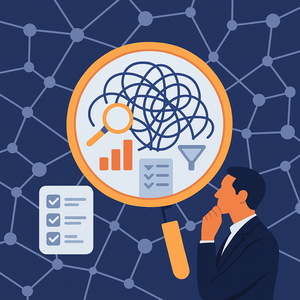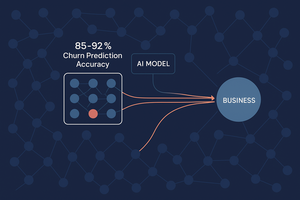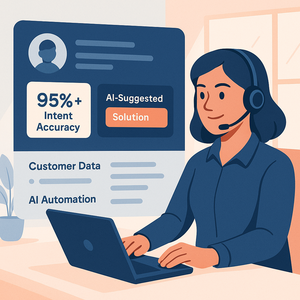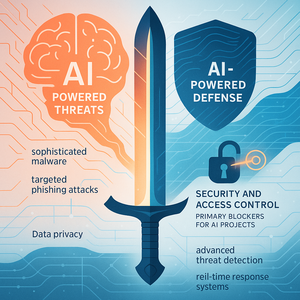Navigating the AI Transformation Tightrope: Balancing Innovation, Regulation, and Human Capital
The artificial intelligence landscape in late 2025 presents a complex picture of immense opportunity tempered by significant operational challenges....
6 min read
 Peter Vogel
:
July 7, 2025
Peter Vogel
:
July 7, 2025

The AI landscape this week is dominated by a confluence of critical themes: increased ethical scrutiny of AI systems, regulatory frameworks gaining teeth, and businesses grappling with the economic realities of AI implementation. These developments signal a shift from the theoretical potential of AI to the practical challenges of responsible and scalable adoption.
This week, we're addressing the most critical AI developments for Operations/Technology Executives, Marketing Leaders, Growth-Focused CEOs, Sales Directors, and Customer Service Leaders, as well as the implications for HR/Training leaders as relevant. Understanding these shifts provides actionable strategies for decision-makers to navigate this transformative era. Helium42 remains at the forefront of these changes, helping businesses strategically implement AI and build responsible AI solutions. This week's developments underscore the need for businesses to act decisively, embracing AI while mitigating its risks and ensuring alignment with ethical principles.

The UK government's recent allocation of £300 million to integrate AI across public services such as the NHS and transport signals a significant commitment to leveraging AI for societal benefit. This initiative is not just about deploying technology; it also places a strong emphasis on ethical audits and workforce retraining, demonstrating a proactive approach to responsible AI adoption (GOV.UK, 2025). This emphasis is crucial, given the potential for AI to exacerbate existing inequalities or introduce new biases if not carefully managed.
The strategy's focus on ethical considerations could have far-reaching implications for private sector AI governance. By setting a high standard for responsible AI implementation in the public sector, the UK government may influence industry best practices and inspire other nations to adopt similar frameworks. This is particularly relevant for sectors dealing with sensitive data or providing essential services, where public trust is paramount. Helium42’s view is that the success of this strategy hinges on a transparent and inclusive approach that involves all stakeholders, including citizens, policymakers, and technology providers.

The EU AI Act, now in force, represents a new global standard for AI regulation, requiring mandatory risk assessments and transparency logs for high-risk AI systems (EUR-Lex, 2025). This legislation has a significant impact on global enterprises operating in the EU market, as companies must redesign their AI deployment frameworks to comply with the Act or face substantial financial penalties. The Act defines ""high-risk"" AI systems broadly, encompassing AI used in healthcare, finance, and critical infrastructure, among others.
Navigating the complexities of the EU AI Act and ensuring compliance across international operations presents a significant implementation challenge. Organisations must invest in robust compliance programmes and develop expertise in AI governance to navigate this new regulatory landscape. Helium42 advises that a proactive and transparent approach is essential to build trust with stakeholders and avoid potential penalties.

A McKinsey report underscores a widening gap in AI maturity between large enterprises and SMEs, with 70% of Fortune 500 companies experiencing significant AI-driven revenue growth while 58% of SMEs struggle with implementation (McKinsey, 2025). This disparity highlights the need for strategic partnerships with AI implementation specialists, as SMEs often lack the internal expertise and resources to effectively deploy AI on their own. For instance, 43% of UK firms cite an ""AI-skilled personnel shortage"" as a top barrier (TechNation 2025 Report, 2025).
Finding the right AI partner and aligning AI initiatives with business goals presents its own set of challenges. Organisations must carefully evaluate potential partners to ensure they have the right expertise and a deep understanding of their specific business needs. Helium42 notes that a successful partnership requires clear communication, shared goals, and a commitment to long-term collaboration.

ASOS's recent achievement of record supply chain efficiency through AI-powered predictive inventory management provides a compelling case study for the retail sector. The company reduced stockouts by 37% and cut inventory costs by 28% (Financial Times, 2025), demonstrating the transformative potential of AI in optimising supply chains.
These results have significant implications for the retail sector, as other retailers are likely to follow suit, investing in AI to optimize their supply chains and improve operational efficiency. The role of predictive analytics in supply chain management is critical, enabling retailers to forecast demand, optimize logistics, and reduce waste. Helium42 emphasizes that a data-driven approach and a focus on measurable outcomes are essential for success in achieving such gains.

A recent DeepMind ethics paper warns of the systemic risks of over-automation without human oversight frameworks, highlighting the concept of automation debt and its potential consequences (Nature, 2025). This warning underscores the need for ethical AI audits to identify and mitigate potential biases and unintended consequences of AI systems.
Defining and implementing ethical AI standards and ensuring ongoing monitoring and accountability presents a significant implementation challenge. Organisations must invest in robust testing and validation protocols to identify and mitigate potential biases in AI systems. Helium42 advises that a proactive and ethical approach to AI development is not just a matter of compliance; it is also a matter of building trust with stakeholders and ensuring the long-term sustainability of AI initiatives.

The artificial intelligence landscape in late 2025 presents a complex picture of immense opportunity tempered by significant operational challenges....

The discourse surrounding artificial intelligence is maturing. Across boardrooms and operational teams, the conversation has decisively shifted from...

The artificial intelligence landscape is no longer a distant frontier; it's rapidly reshaping the present, demanding a strategic response from...